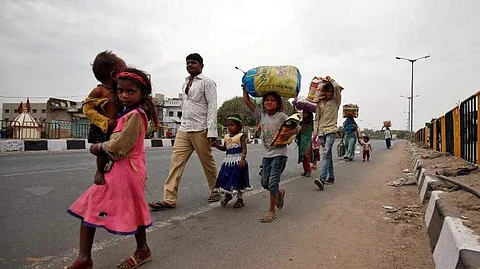

The Coronavirus pandemic has affected 7,875 Indians and has claimed 250 lives so far. The lockdown might help keep the virus from spreading, but it has also left a major section of society without an income. The government — both at the centre and the state — have released multiple schemes as a response to cope with this crisis but the question that remains is whether the relief is really reaching the beneficiaries it is intended for. A study by Jan Sahas, a civil society organisation, revealed that most of the workers and daily wage earners did not have proper information about the schemes or how to avail the funds allocated to provide relief.
On March 25, the Finance Minister of India allocated Rs 1.7 lakh crore under the Pradhan Mantri Gareeb Kalyan Yojana which aims to provide ration through the Public Distribution System (PDS) and financial assistance through Direct Benefit Transfer (DBT). The scheme has provisions for fund transfer to farmers, widows, elderly and disabled pensioners, women Jan Dhan account holders, and to increase the MGNREGA wages by Rs 20 but there's a catch. "These monetary benefits will be accessible only to that section of the population who have functional bank accounts or are linked to pre-existing social security schemes. Jan Sahas database of approximately 60,000 workers suggests that 17 per cent of workers do not have a bank account hence, they will be excluded from gaining any benefit from the financial package announced. Through our extensive experience of working with migrant labourers, we have also come to learn that these bank accounts are inactive for at least 30-40 per cent of labourers who have accounts," read the study.
The government has also decided to give out Rs 32,000 crore from the Building and Other Construction Workers’ (BOCW) Welfare Fund — which includes both pending and new allocations — to provide relief. "The Finance Minister, while announcing these schemes, said that 3.5 crore people are registered with them and they will be given the benefits. Our survey revealed that less than 6 per cent of people are registered. The problem is that the groundwork that was required to build the database to provide the relief now is not there. If 94 per cent of the people are not registered, who are the schemes going to help?" asks 36-year-old Ashif Shaikh, the founder of Jan Sahas.
Around 14 per cent of the workers mentioned that they did not have ration cards and about 12 per cent mentioned that they could not access it from their current location as they were migrants. Ashif does not only have the statistics of the problem at hand, but suggestions to solve it as well. "The government should open the PDS system for all. The benefits should be available for everyone — even Ratan Tata and the Ambanis. If it is open to all, the problem of what profession one pursues or where his Aadhar and Ration Cards are registered does not arise. Anyone who is in need can be given a basic ration," pointed out Ashif. But what about people misusing the system? "Well, there is a very thin stratum of people who do not need it, but will still make use of this provision. But that number is really less. Our priority should be that no one should starve during this time of crisis rather than verifying details or a card and debating where the person should collect his ration from. This can be done for at least a year," added Ashif.
Another way could be registering the worker en masse. "The government can tie-up with the industry and conduct a large drive to register lakhs of people each day. Once the registration is complete they can transfer the money to their bank accounts — 84 per cent of the people we spoke to have bank accounts. The government also has to take care of those who have pregnant or nursing women, malnourished children or specially-abled family members by giving them a little extra ration for at least a year," added Ashif.
The government has decided to restart the Mahatma Gandhi National Rural Employment Generation Act (MGNREGA) Scheme from April 15 and this can prove to be very helpful, thinks Ashif. "There probably won't be much job generation now, but the good thing about MGNREGA is that it also provides an unemployment allowance. An unemployment benefit will be very helpful, not just for the rural citizens, but the urban people as well," said Ashif.
The survey conducted during the first few days of the lockdown found that 42.3 per cent workers stated that they did not have any ration left for the day, let alone for the next few days. "The government and the NGOs are helping these people tide over this time of distress but society, as a whole, has made the most contribution in this aspect. The workers have been helped by people at various points with ration and shelter," concluded Ashif.
